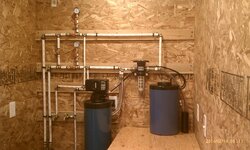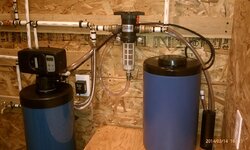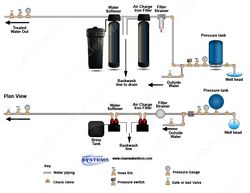I got my well test back. Everything except iron and manganese look good. It's not a surprise since the toilet bowls were staining right away.
Iron is at 3.6 mg/L and Manganese at 0.21 mg/L. Apparently this is just a taste/nuisance issue.
Anyone else have experience with this? Can I just filter it?
I had iron/manganese in my well water and beat it. A water softener is not an iron filter, it will remove low amounts of iron but will foul the media. If your water is not hard (mine wasn't) then you don't need a softener.
You probably have some sulfur in that water as well since those three elements are like the three stooges, always hanging out together. The smell of iron, sulfur, and manganese plus each of their bacterial smells are all pretty similar and hard to tell apart. The smell is swampy, septicy, and sometimes eggy.
You are correct that iron and manganese are nuisance issues. It's gross but safe. Your numbers are way too high for a softener to get it done.
Iron removal methods also remove manganese and usually sulfur by oxidizing it from the dissolved state into a solid and then filtering it out. In your toilet (shower, dishwasher, sink) the aeration oxidizes the element and it scales onto your surfaces. Hard to remove and it smells too.
I chose to install a manganese oxide iron filter which uses no salt but I do need to throw in some bleach every week or so to prevent iron bacteria from sludging things up. This filter is the same thing I use in municipal water treatment for large scale manganese removal and not some kind of gimmick. See my photos. I bought my system at
http://www.cleanwaterstore.com/iron-manganese-filters.html and have been very happy with the
performance. Self installed of course. In the photo you will see the little side chlorine tank for backwash and the screen to remove grit before the iron filter.
Another option if you have your own well is chlorination (nice to keep things clean) followed by filtration and or carbon filter to remove the solid iron/mang plus the carbon will strip the chlorine away too. I have a community well so chlorination is significantly more expensive.
Take a long read at that site I linked and you will find lots of information. Remember, softeners are for hard water not for iron.




